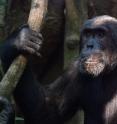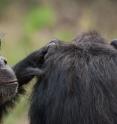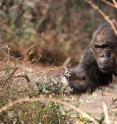Intimidating chimpanzee males are more likely to become fathers
Chimpanzee males that treat females aggressively father more offspring over time. The findings, in the Cell Press journal Current Biology on November 13, are based on genetic evidence of paternity and suggest that sexual coercion via long-term intimidation is an adaptive strategy for males in chimpanzee society. "These results seem to suggest that males are selected to be aggressive toward females to increase their paternity success, which explains why male-female aggression is observed in so many chimpanzee populations," says Joseph Feldblum of Duke University.
Chimpanzee males are known to direct surprising amounts of aggression toward their female group mates, according to the researchers, but previous studies of mating success had found evidence both for and against the presence of sexual coercion in wild chimps.
To help get to the bottom of it, Feldblum and his colleagues looked to a chimpanzee community living in Tanzania's Gombe National Park that had been under close observation for the last 50 years. In fact, the researchers knew not just who had mated with whom, but also who the biological fathers of nearly all chimpanzees born in the community since 1995 were, based on genetic tests of paternity.
The researchers examined the effect of male aggression toward females both when the females were sexually receptive and swollen and when they were not.
Their analyses showed that male aggression during a female's swollen periods led to more frequent mating but not greater paternity success. On the other hand, high-ranking males that showed aggression toward females when those females were not swollen were rewarded for their bullying with more offspring.
The findings show that long-term patterns of intimidation allow high-ranking males to increase their reproductive success, offering what may be the first genetic evidence of sexual coercion as an adaptive strategy in any social mammal.
Feldblum says he is interested to find out whether some males might find success in paternity in kinder, gentler ways, for instance by spending more time grooming females.
Either way, he adds, the findings in chimps probably don't have much to tell us about sex and parenthood in human society, despite our close evolutionary ties. That's because of obvious differences in the mating behavior between our two species.
"The glaring difference between chimpanzee and human mating behavior is that in chimpanzees females mate promiscuously with most male group mates during most cycles, while human females do not," Feldblum says. "Thus, the system that favors male coercion in chimpanzees is not present in humans to favor this behavior."
Source: Cell Press
Other sources
- Intimidating chimpanzee males are more likely to become fathersfrom Science DailyFri, 14 Nov 2014, 9:31:38 UTC
- Chimpanzee study reveals the value of being an ape bullyfrom Reuters:ScienceThu, 13 Nov 2014, 22:10:05 UTC
- Aggression in male chimpanzees leads to mating successfrom Science BlogThu, 13 Nov 2014, 19:00:12 UTC
- Male Sexual Aggression: What Chimps Can Reveal About Peoplefrom Live ScienceThu, 13 Nov 2014, 17:31:09 UTC
- Intimidating chimpanzee males are more likely to become fathersfrom PhysorgThu, 13 Nov 2014, 17:00:40 UTC


